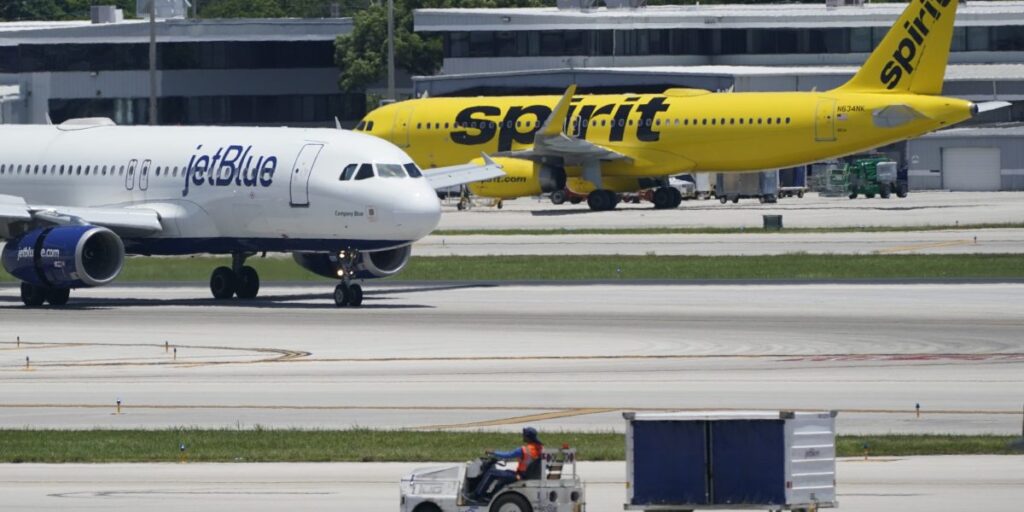
JetBlue Airways and Spirit Airlines are ending their proposed $3.8 billion deal weeks after a federal judge blocked the deal, saying it would hurt consumers who depend on Spirit’s low fares.
JetBlue said Monday that although the two companies still believed in the deal, they were unlikely to meet the closing conditions required in the agreement before the July 24 deadline.
JetBlue’s new CEO, Joanna Geraghty, called the merger “a bold and daring plan aimed at shaking up the industry’s status quo” and accelerating JetBlue’s growth.
“However, with the federal court ruling and continued opposition from the Justice Department, the likelihood of getting the green light to move forward with the merger anytime soon is very low,” Geraghty said in a memo to New York Airline employees. He said uncertainty over the fate of the merger was distracting the airline from trying to return to profitability.
Spirit CEO Ted Christie said he was disappointed the airlines couldn’t come together and mount a new challenge to the nation’s four biggest airlines, but said he was confident Spirit — which has been making money since the pandemic began Losing – can be successful on its own.
The Justice Department sued last year to block the merger, saying it would reduce competition and raise fares, especially for travelers who rely on low-cost Spirits.
In January, a federal district judge in Boston sided with the government and blocked the deal, saying it violated antitrust laws.
On Monday, the Justice Department claimed victory.
“Today’s decision by JetBlue is another victory for the Department of Justice’s work on behalf of American consumers,” Attorney General Merrick Garland said in a statement. “The Justice Department proved in court that the merger between JetBlue and Spirit will leave millions of travelers facing higher fares and fewer choices. We will continue to vigorously enforce the nation’s antitrust laws.”
The airlines appealed the decision, and a hearing was scheduled for June in the 1st U.S. Circuit Court of Appeals in Boston.
The Justice Department of the Biden administration, which fights against consolidation in many industries, previously struck down a partnership between JetBlue and American Airlines on flights in New York and Boston.
The collapse of the sale at JetBlue could leave Spirit in an unusual position, facing debt payments while a portion of its planes are grounded due to engine problems.
Unlike major airlines that attract more upscale travelers — and now offer their own bare-bones fares to compete with budget carriers — Spirit hasn’t been immune to the pandemic. It has lost 447 million dollars last year and 1.9 billion dollars since the beginning of 2020.
A JPMorgan Chase analyst said in January that he could not see a viable path for Spirit to return to profitability on its own anytime soon.
JetBlue is also losing $2.2 billion through 2020. But JetBlue’s revenue is about 80% higher than Spirit’s, giving it more cushion against a losing streak. Activist investor Carl Icahn bought 10 percent of JetBlue stock last month and won two seats on the airline’s board.
Spirit announced a $2.2 billion merger with Frontier Airlines in early 2022. The deal would have brought together two similar carriers that charge lower fares than major airlines but increase the fees that generate the bulk of their revenue.
JetBlue, which more closely resembles major airlines in its business model, entered the fray against the wishes of Spirit management, which warned that it would be difficult to get regulatory approval for a deal that would become the nation’s largest. Ended a low-free career. JetBlue headed Spirit’s board, went straight to Spirit’s shareholders, and won a bidding war against Frontier a few months later.
By the time JetBlue’s purchase wound up in court, there were continuing losses and other problems at Spirit, which is based in Miramar, Florida. Some analysts questioned whether the deal still made financial sense for JetBlue.
In late January, after a court ruling in favor of the Justice Department, JetBlue warned Spirit that it could terminate the contract. JetBlue will pay Spirit a breakup fee of $69 million.
Some consumer advocates applauded Dell’s demise. They opposed JetBlue’s plan to phase out Spirit’s low-cost model.
“Even if consumers don’t fly on low-cost carriers like Spirit, they help keep fares down by putting pressure on legacy carriers,” said Katie Nostro of travel site Going. “Cheap flight lovers can breathe a little easier across the board.”
The end of the deal raises questions about whether Alaska Airlines can pull off its proposed purchase of Hawaiian Airlines for $1 billion and assume $900 million in debt. The Justice Department has not indicated whether it will sue to block the deal. Neither of these airlines is a discount carrier like Spirit and Frontier.
“Winning such a complex, uncertain case should make (the Justice Department) feel energized, and it certainly sends a message to the industry,” said John Newman, a University of Miami law professor and Justice Department antitrust advocate. Former trial attorney. division Every case is different, he said, “but they will definitely take a hard look” at the Alaska-Hawaii deal.
Spirit Airlines Inc. Shares closed down 11 percent and have fallen more than 60 percent since U.S. District Judge William Young ruled against the merger on Jan. 16. JetBlue Airways Corp. Shares rose 4 percent
